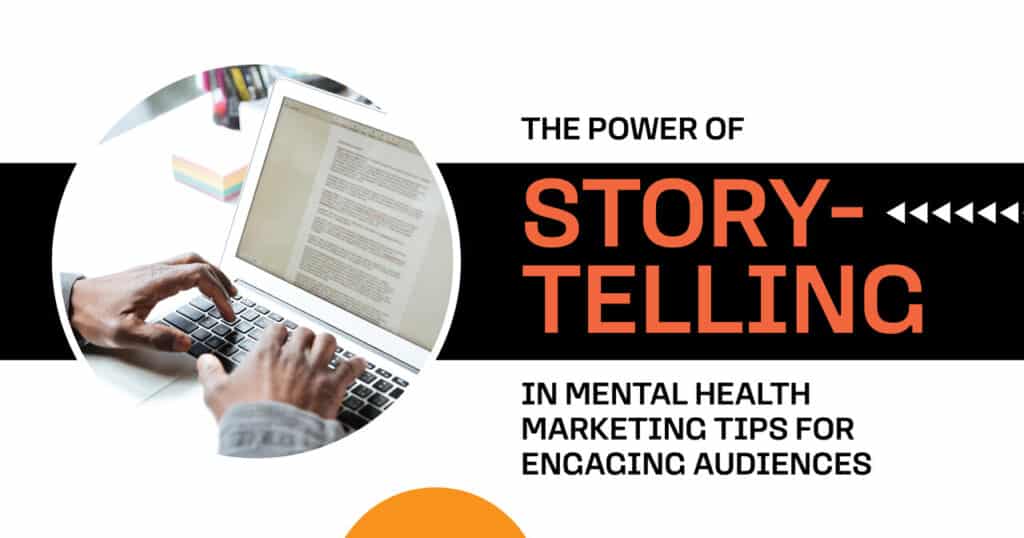In the realm of mental health, storytelling is not just a marketing tool; it’s a bridge that connects experiences, fosters understanding, and kindles hope among individuals. As mental health organizations aim to break down stigma and promote services, the art of storytelling emerges as a potent catalyst for engagement and change. This article dives deep into the strategies that can make storytelling a core element of mental health marketing, illustrating how personal narratives and compelling content can engage audiences more profoundly than conventional marketing tactics.
The Essence of Storytelling in Mental Health
Storytelling in mental health marketing does more than relay information—it evokes emotions and builds connections.
Why Storytelling Works
- Emotional Resonance: Stories tap into emotions, making them more memorable and impactful.
- Enhanced Empathy: Hearing about real-life experiences through stories can increase empathy and understanding, reducing stigma around mental health issues.
Components of a Powerful Story
- Authenticity: Genuine stories resonate more deeply with audiences.
- Relatability: Stories that reflect everyday human experiences are more engaging.
Crafting Stories That Stick
Creating compelling stories involves understanding your audience and what drives them.
Know Your Audience
- Demographic Insights: Tailor stories to your target audience’s age, background, and interests.
- Psychographic Understanding: Dive into the emotional and psychological factors influencing your audience’s behaviors and preferences.
Storytelling Techniques
- Narrative Arcs: Every good story has a beginning that sets the scene, a middle that builds tension, and an end that provides resolution.
- Character Development: Develop characters in your stories that your audience can root for or relate to.
Using Storytelling to Break Down Stigma
In mental health marketing, the right story can challenge misconceptions and change attitudes.
Personal Recovery Journeys
- Success Stories: Share testimonials and case studies that showcase the success of your treatments or services.
- Overcoming Challenges: Highlight stories that focus on overcoming struggles, which can inspire others to seek help.
Educational Narratives
- Informative Storytelling: Use stories to educate your audience about mental health conditions, treatment options, and lifestyle tips that promote mental well-being.
- Myth Busting: Craft narratives that debunk common myths and misconceptions about mental health.
Integrating Storytelling Across Your Marketing Channels
To maximize impact, integrate storytelling into all aspects of your marketing strategy.
Digital Platforms
- Social Media: Use platforms like Instagram, Facebook, and Twitter to share short stories, videos, and images that convey powerful messages.
- Blogs and Articles: Write detailed stories or regular columns that delve deeper into mental health topics.
Traditional Media
- Print Materials: Incorporate stories into brochures, flyers, and posters.
- Public Speaking: Share stories during workshops, seminars, and public talks to connect with audiences in person.
FAQs: Harnessing Storytelling in Mental Health Marketing
Q1: How often should we share new stories?
A: Consistency is key. Aim to share new stories regularly to keep your audience engaged, whether that’s weekly, biweekly, or monthly, depending on your resources.
Q2: How can we ensure our stories are respectful and sensitive?
A: Always get consent from individuals whose stories are shared, ensure accuracy in portraying mental health conditions, and avoid sensationalism to maintain dignity and respect.
Q3: Can storytelling be integrated into fundraising efforts?
A: Absolutely! Emotional and compelling stories can significantly boost fundraising campaigns by illustrating the impact of donations and engaging potential donors on a personal level.
Conclusion: Transforming Minds Through Tales
Storytelling in mental health marketing isn’t just about selling a service; it’s about changing lives and perceptions. By leveraging the intrinsic power of stories, mental health organizations can create a profound impact, turning abstract statistics into relatable experiences and fostering a community that’s informed, empathetic, and engaged. As you craft your narratives, remember that each story shared is a step towards a more understanding world.
For more insights on effective storytelling techniques and mental health marketing, websites like the Content Marketing Institute and Mental Health America offer valuable resources and guidance.








